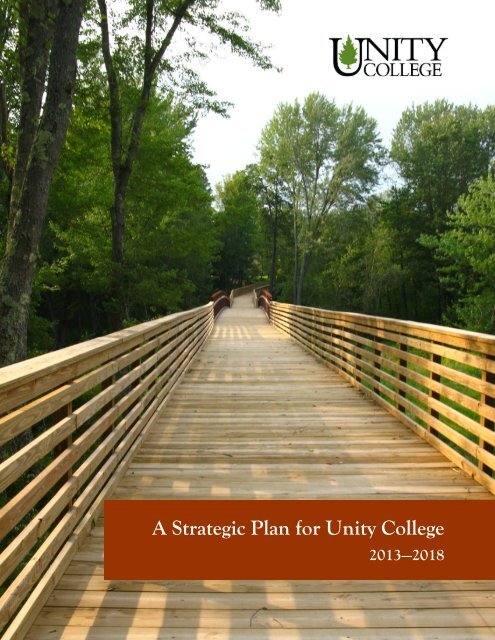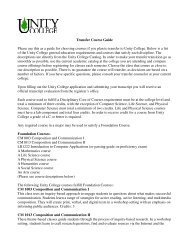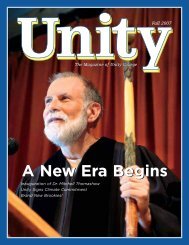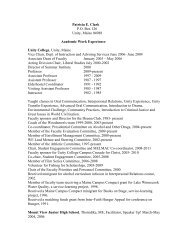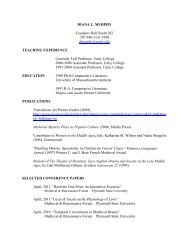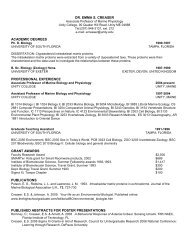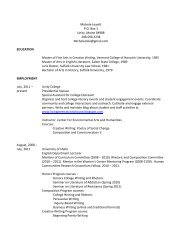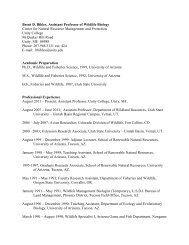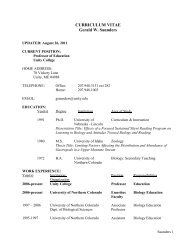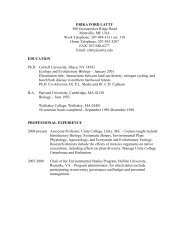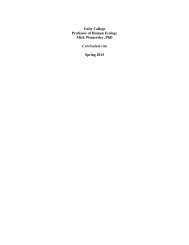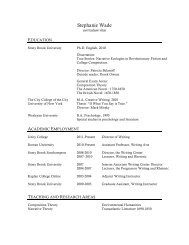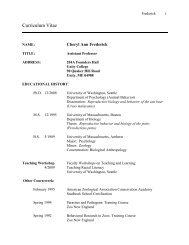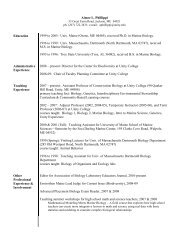A Strategic Plan for Unity College
A Strategic Plan for Unity College
A Strategic Plan for Unity College
- No tags were found...
You also want an ePaper? Increase the reach of your titles
YUMPU automatically turns print PDFs into web optimized ePapers that Google loves.
A <strong>Strategic</strong> <strong>Plan</strong> <strong>for</strong> <strong>Unity</strong> <strong>College</strong><br />
2013—2018
<strong>Unity</strong> <strong>College</strong> is a small, private college in rural Maine that provides<br />
dedicated, engaged students with a liberal arts education that<br />
emphasizes the environment and natural resources. <strong>Unity</strong> <strong>College</strong><br />
graduates are prepared to be environmental stewards, effective<br />
leaders, and responsible citizens through active learning experiences<br />
in a supportive community.
A STRATEGIC PLAN<br />
FOR UNITY COLLEGE<br />
<strong>Unity</strong> <strong>College</strong><br />
<strong>Unity</strong> <strong>College</strong> was founded in 1965<br />
by a group of local citizens concerned<br />
about the future of <strong>Unity</strong>, Maine, to<br />
help revitalize the local economy.<br />
Founded as a co-educational liberal<br />
arts college, <strong>Unity</strong> <strong>College</strong> developed<br />
a distinctive environmental focus. Its<br />
proximity to abundant natural<br />
resources, valuable <strong>for</strong> experiential<br />
learning, undoubtedly played a part in<br />
the development of its mission.<br />
<strong>Unity</strong> <strong>College</strong> is a small environmental<br />
college located in rural central Maine,<br />
serving roughly 550 students. Our mission<br />
is to train a new generation of<br />
environmental leaders. The <strong>College</strong><br />
believes that 21st century environmental<br />
changes require the total engagement of<br />
higher education, and that belief is the<br />
core of its curriculum and operations.<br />
Filling a niche of growing regional and<br />
national significance, <strong>Unity</strong> is poised to<br />
emerge as a college recognized <strong>for</strong><br />
challenging academics, innovative programming,<br />
and exemplary sustainable facilities.<br />
The <strong>College</strong> demonstrates real-world<br />
solutions to environmental issues. <strong>Unity</strong><br />
embraces a transdisciplinary approach to<br />
sustainable solutions, or Sustainability<br />
Science. This approach integrates local<br />
economy with global ecology, emphasizes<br />
art and reflective awareness, stresses the<br />
importance of strong communications<br />
skills, and helps our students and our<br />
community members live more fulfilling lives<br />
while guiding them to service-based careers.<br />
1
Rationale and Challenge<br />
The past decade has seen continued<br />
movement by the <strong>College</strong> in three<br />
important dimensions. First, the<br />
proportion of comprehensive, systematic<br />
ef<strong>for</strong>ts guided by college administrative<br />
and board leadership has increased, to<br />
better complement the ef<strong>for</strong>ts conducted<br />
at the level of Centers and offices.<br />
Second, sophistication of assessment and<br />
review has increased, with better use of<br />
internal and external data. Finally, some<br />
positive feedback loops have emerged, as<br />
plans and appraisal of their attainment<br />
in<strong>for</strong>m us about our work. However,<br />
2010 brought to its conclusion the<br />
strategic planning process <strong>for</strong> the years<br />
2006–2010, with much of the planning<br />
unimplemented. Our challenge at this<br />
junction is to create, communicate,<br />
implement, and assess a new direction <strong>for</strong><br />
the <strong>College</strong> that positions us to successfully<br />
educate 21st-century students to resolve<br />
21st-century environmental problems.<br />
While planning without implementation<br />
is wasted ef<strong>for</strong>t, implementation without<br />
financial consideration is unwise, and<br />
expectation without communication is<br />
wishful thinking. The results and progress<br />
of this plan will be reported to the faculty<br />
and staff annually. The reporting responsibilities<br />
<strong>for</strong> the strategic plan progress and<br />
financial consequences (both positive and<br />
negative) will be shared between the Vice<br />
President <strong>for</strong> Academic Affairs and the Vice<br />
President of Finance and Administration.<br />
2
The Mission of <strong>Unity</strong> <strong>College</strong><br />
<strong>Unity</strong> <strong>College</strong> is a mission-driven<br />
institution with a clear, concise mission<br />
statement:<br />
<strong>Unity</strong> <strong>College</strong> is a small, private college in<br />
rural Maine that provides dedicated,<br />
engaged students with a liberal arts<br />
education that emphasizes the environment<br />
and natural resources. <strong>Unity</strong> <strong>College</strong><br />
graduates are prepared to be environmental<br />
stewards, effective leaders, and responsible<br />
citizens through active learning experiences<br />
in a supportive community.<br />
The mission statement figures<br />
prominently on the agenda of every<br />
meeting of the board of trustees. It<br />
appears on the college website, in<br />
numerous college publications, and in<br />
every press release the college issues.<br />
The mission guides not only curriculum,<br />
pedagogy, and student activities, but also<br />
scholarship and research, often involving<br />
students. Much of this occurs as service—<br />
often embedded in courses or student<br />
clubs—to <strong>Unity</strong> and surrounding<br />
communities. The mission imbues the<br />
college with concern <strong>for</strong> the environment<br />
and natural resources, focuses studies in<br />
that arena, and underlies faculty and<br />
student commitment to student-active<br />
pedagogies and opportunities to engage<br />
with real-world problems in classrooms<br />
and in local communities.<br />
3
<strong>Strategic</strong> Themes <strong>for</strong> Advancing the <strong>College</strong><br />
<strong>Unity</strong> <strong>College</strong> has seen much growth over the past decade, with marked<br />
improvements on every level. For example, we have increased brand<br />
recognition, improved the diversity of our student body, and developed<br />
better facilities and academic programs. This progress is certainly noteworthy,<br />
yet reflection, improvement, and focus need to be maintained to<br />
bring even greater national prominence and stability to the <strong>College</strong>.<br />
Within the strategic planning ef<strong>for</strong>t, key areas <strong>for</strong> emphasis, or Goals, have<br />
been identified, yet we believe that there are critical components, or Themes.<br />
of the <strong>College</strong>’s mission that need to be emphasized throughout the strategic<br />
plan, The specific Goals should address as many of these Themes as possible.<br />
These Themes have been identified because they reflect the <strong>College</strong> identity<br />
or are integral to the financial stability, success, and growth of the <strong>College</strong>.<br />
The Themes, which overarch each Goal, are as follows:<br />
4<br />
Sustainability Science<br />
Curricular programs will focus on the<br />
emerging field of sustainability science,<br />
which probes interactions among natural,<br />
social, and human systems, the complex<br />
mechanisms that lead to the degradation of<br />
these systems, concomitant risks to human<br />
well-being, and a transdisciplinary approach<br />
to problem-solving. Our students must be<br />
prepared to solve environmental problems<br />
holistically through a sustainability science<br />
lens. Since we are already a college with an<br />
environ-mental emphasis, we can refine the<br />
curriculum to reflect this most current and<br />
meaningful transdisciplinary approach to<br />
understanding and working in the<br />
environment. This curriculum will reflect the<br />
constant dynamism of the environment that<br />
our students will face when they graduate,<br />
and it will provide them with the tools to<br />
be effective and successful. We want our<br />
environmental mission, with a focus on<br />
sustainability, to be reflected throughout the<br />
college, including facilities and<br />
maintenance, curricular and co-curricular<br />
programming, and the actions of faculty,<br />
students, and staff. Because of these<br />
reasons, every primary planning Goal<br />
emphasizes sustainability science.<br />
Financial Stability<br />
Student tuition dollars are the primary<br />
source <strong>for</strong> the <strong>College</strong>’s budget, but the<br />
<strong>College</strong> must develop support <strong>for</strong> its<br />
budget in other ways. Adding revenue<br />
streams to the college budget, working to<br />
create additional programs, and considering<br />
ways to use the college campus in the<br />
summer, are all part of the working plan<br />
<strong>for</strong> adding to the financial stability of the<br />
college. All goals reflect these essential<br />
considerations <strong>for</strong> <strong>Unity</strong>’s long-term<br />
stability and viability.
Enrollment<br />
More than ever, <strong>Unity</strong> <strong>College</strong> must offer<br />
high quality, attractive, unique, and<br />
marketable products, <strong>for</strong> a number of<br />
reasons:<br />
The current economic climate<br />
The demographics of fewer high<br />
school students possessing the<br />
resources to pursue an undergraduate<br />
degree<br />
An increase in the number of<br />
sustainability programs at our<br />
competitor schools<br />
<strong>Unity</strong> <strong>College</strong>’s ability to attract and<br />
retain students every year is integral to the<br />
long-term stability of the <strong>College</strong> and<br />
should be considered <strong>for</strong> every planning<br />
Goal.<br />
Student Success<br />
Graduating <strong>Unity</strong> <strong>College</strong> alumni who can<br />
be successful in the work <strong>for</strong>ce is essential.<br />
Academic and residential programs<br />
should reflect strong commitment to<br />
providing both a high-quality education<br />
and an inspiring environment <strong>for</strong> student<br />
growth. <strong>Unity</strong> <strong>College</strong> aims <strong>for</strong> every<br />
department and staff member to understand<br />
and fulfill their responsibility <strong>for</strong><br />
supporting student success.<br />
Community Connections<br />
Service to each other and to the broader<br />
community has always been a source of<br />
pride and learning <strong>for</strong> the people who<br />
work and study at <strong>Unity</strong> <strong>College</strong>.<br />
Emphasizing and creating more<br />
comprehensive and clear connections<br />
among community members is essential in<br />
order to be our best. This is an important<br />
theme not only <strong>for</strong> improved pedagogy,<br />
but also <strong>for</strong> creating clear communication<br />
links among constituents within the<br />
<strong>College</strong> and within the expanding<br />
community of constituents, nationally and<br />
internationally.<br />
The strategic Goals that follow support the mission of the <strong>College</strong>,<br />
and each addresses the broader strategic themes described above.<br />
5
Goal 1<br />
Establish and strengthen excellence in teaching and learning.<br />
The strategic plan organizes the work of improving academics into two<br />
sections: one focused on curriculum and the other focused on staff. In both<br />
sections, we emphasize sustainability science and community connections as<br />
the primary means of improving the curriculum, strengthening the staff, and<br />
implementing innovative pedagogies. Such work supports student success,<br />
which we expect will lead to greater financial stability and robust enrollment.<br />
To achieve this goal, <strong>Unity</strong> <strong>College</strong> will:<br />
Objective 1: Improve curriculum and delivery<br />
a) Increase student engagement and<br />
achievement (rigor/expectations)<br />
i) Implement an honors program<br />
ii) Implement a visible, linked, supported<br />
undergraduate research program<br />
iii) Increase opportunities <strong>for</strong> student<br />
research, scholarship, and creative<br />
work<br />
iv) Implement systems and services to<br />
track, evaluate, and improve<br />
student learning and satisfaction<br />
b) Emphasize and promote the<br />
important role of community-based<br />
learning (CBL) in the curriculum and<br />
in achieving the school’s mission<br />
i) Expand the involvement of<br />
students, faculty, and staff in<br />
community activities<br />
ii) Develop systems to track and<br />
engage students and faculty in<br />
service activities<br />
c) Create more visible, deliberate links<br />
between sustainability science and<br />
curriculum<br />
d) Cultivate a culture of respect <strong>for</strong><br />
diversity and inclusion<br />
i) Increase diversity of students,<br />
faculty, and staff<br />
ii) Develop deliberate, coordinated<br />
curricular and co-curricular means<br />
of implementing diversity education<br />
6
e) Diversify the teaching in general<br />
education and CBL courses to include<br />
more faculty members<br />
f) Create community grading standards<br />
and ensure academic integrity<br />
g) Encourage innovative, effective,<br />
flexible pedagogies that match our<br />
mission<br />
h) Review and coordinate student<br />
services, such as the Learning<br />
Resource Center, the Writing Center,<br />
Supplement Instruction, and the<br />
Library<br />
Objective 2: Improve Recruitment, Retention, and Quality of Life <strong>for</strong> Faculty and Staff<br />
a) Increase faculty professional<br />
development opportunities and<br />
support <strong>for</strong> implementing transdisciplinary<br />
training, effective<br />
pedagogies, sustainability science, and<br />
technology in the classroom<br />
b) Improve faculty excellence in research<br />
and scholarship<br />
c) Invest in more faculty to meet current<br />
course needs, equity concerns, and<br />
program development<br />
d) Provide equitable workload<br />
compensation <strong>for</strong> the teaching of<br />
laboratories.<br />
e) Provide adequate salaries to retain and<br />
recruit quality faculty and staff<br />
f) Increase the instructional budget<br />
g) Increase the number of salaried<br />
academic staff who can provide<br />
academic support to faculty plus teach<br />
in the classroom (e.g., farm manager,<br />
sustainability coordinator, and lab<br />
preparatory)<br />
7
Goal 2<br />
Develop a comprehensive plan that enhances the <strong>College</strong>’s connections<br />
to students and their families, employees, and the local community.<br />
As the college works to improve enrollment, retention, and financial<br />
stability, it is important to also develop strong and vibrant communities.<br />
These communities are the lifeblood that promotes a positive and healthy<br />
campus life <strong>for</strong> all its constituents and contribute a significant impact upon<br />
the <strong>College</strong>’s financial stability, enrollment, retention, visibility, and the<br />
success of our students both academically and in their personal growth.<br />
This goal is organized into three parts: community connections, student life,<br />
and facilities. To achieve this goal, <strong>Unity</strong> <strong>College</strong> will:<br />
Objective 1: Community Connections<br />
a) Improve communication and decisionmaking<br />
process in order to strengthen<br />
morale, increase efficiency, and<br />
decrease response time <strong>for</strong> crises and<br />
opportunities<br />
b) Provide email access <strong>for</strong> all employees<br />
and alumni<br />
c) Re-evaluate and clarify job descriptions,<br />
roles, and responsibilities<br />
d) Offer all campus constituents the<br />
opportunity to be involved in the<br />
<strong>College</strong>’s decision-making processes<br />
e) Encourage a per<strong>for</strong>mance-oriented<br />
culture by defining key metrics of<br />
success, and then regularly measuring<br />
and rewarding successes.<br />
f) Implement per<strong>for</strong>mance/merit-based<br />
compensation <strong>for</strong> appropriate positions.<br />
g) Improve the availability of and access<br />
to staff training opportunities<br />
h) Prioritize money in budgets <strong>for</strong> staff<br />
development<br />
i) Build positive community perceptions<br />
i) Increase involvement and visibility<br />
of faculty and staff in local events<br />
ii) Encourage involvement of<br />
townspeople attending and<br />
participating in <strong>College</strong> events<br />
iii) Acknowledge and support local<br />
initiatives that are aligned with<br />
sustainability science and <strong>College</strong><br />
mission<br />
- Community food partnerships<br />
- Community energy initiatives<br />
- Natural resource management<br />
iv) Increase quality and consistency of<br />
civic engagement work<br />
8
Objective 2: Student life<br />
a) Develop the current student<br />
leadership program to increase and<br />
enhance student leadership<br />
opportunities<br />
b) Integrate student life activities with<br />
academic activities so that living and<br />
learning permeate the campus<br />
c) Be willing to fail while attempting<br />
creative ef<strong>for</strong>ts to help students in<br />
need<br />
d) Create flexible student programs so<br />
that “one size fits all” is not our model<br />
e) Encourage and accept uniqueness in<br />
student choices such as lifestyle, career<br />
goals, or opinions<br />
Objective 3: Facilities<br />
a) Develop a residential facility plan that<br />
will meet the needs of 21st-century<br />
students, meet the diverse needs of<br />
students, and increase revenue<br />
opportunities <strong>for</strong> the <strong>College</strong><br />
b) Develop a plan <strong>for</strong> upper-class housing<br />
c) Improve the Student Activities<br />
Building<br />
d) Upgrade classroom space <strong>for</strong> learning<br />
per<strong>for</strong>mance<br />
e) Develop appropriate signage <strong>for</strong><br />
buildings and campus features<br />
f) Fully utilize In<strong>for</strong>mational Technology<br />
to assist campus operations and learning<br />
i) Effectively maintain and upgrade<br />
existing systems<br />
ii) Increase administrative system<br />
efficiencies<br />
iii) Amplify traditional pedagogies,<br />
mechanisms, and resources, and<br />
mitigate barriers to experiencebased<br />
learning.<br />
9
Goal 3<br />
Maximize visibility and esteem of the <strong>College</strong>.<br />
<strong>Unity</strong> <strong>College</strong> must increase its brand awareness and differentiate itself from<br />
competitor institutions. In light of this necessity, the college will execute<br />
several changes to marketing and external communications in order to<br />
enhance the profile of <strong>Unity</strong> <strong>College</strong> across a full range of both internal and<br />
external audiences. The public will see <strong>Unity</strong> <strong>College</strong> as a unique integrator<br />
of the liberal arts and sciences, and a source of sustainability-minded 21stcentury<br />
leaders and problem-solvers. We will couple the existing power of<br />
the <strong>Unity</strong> <strong>College</strong> brand with a<br />
broad range of marketing activities.<br />
<strong>Unity</strong> <strong>College</strong> is populated with<br />
faculty, staff, and students well<br />
positioned to make advances in<br />
sustainability science. However, we<br />
must improve our ability to<br />
communicate student and faculty<br />
work to a broader<br />
audience,particularly prospective<br />
students and donors. This work<br />
will begin with careful assessment<br />
of our current brand position in<br />
the higher education marketplace<br />
and incorporate subsequent<br />
adaptation to meet new<br />
opportunities.<br />
10
To accomplish this goal, <strong>Unity</strong> <strong>College</strong> will:<br />
Objective 1: Evolve the brand<br />
a) Build upon our existing brand to<br />
capitalize on our history while<br />
adapting to a changing highereducation<br />
environment<br />
i) Hire professional services to<br />
produce a cogent situation analysis<br />
that can be used as the foundation<br />
<strong>for</strong> marketing<br />
ii) Refine our mission and vision to<br />
reflect current strengths and<br />
opportunities in the marketplace<br />
b) Create a dedicated office of Marketing<br />
and Communications to oversee<br />
marketing and external<br />
communication initiatives<br />
i) To include marketing, the website,<br />
events planning, and<br />
communications functions<br />
ii) Charged to increase the visibility,<br />
brand, and reputation of <strong>Unity</strong><br />
<strong>College</strong><br />
c) Develop a detailed and explicit<br />
integrated marketing plan<br />
emphasizing our premium values<br />
Objective 2: Increase awareness<br />
a) Use research and partnerships to share<br />
our story with a wider audience of<br />
both applicants and donors<br />
b) Vigorously promote <strong>Unity</strong> <strong>College</strong> in<br />
new geographic and demographic<br />
sectors of the higher education<br />
marketplace<br />
c) Create new “pillar” programs to build<br />
steady enrollment across several<br />
programs and expand the number of<br />
programs with high enrollment<br />
d) Rein<strong>for</strong>ce the value of a liberal arts<br />
education combined with practical<br />
skills<br />
e) Teach global awareness, consequences<br />
of environmental change, and<br />
sustainability science<br />
11
Goal 4<br />
Improve infrastructure across campus.<br />
As an institution devoted to sustainability, <strong>Unity</strong> <strong>College</strong> understands the<br />
importance of place. The framework of sustainability science allows the<br />
<strong>College</strong> to improve the physical spaces on campus in ways that align with<br />
<strong>Unity</strong>’s mission. <strong>Unity</strong> <strong>College</strong> will evolve as a living-learning community<br />
and a working laboratory <strong>for</strong> building and living more sustainable lives.<br />
Attention to community connections provides another important set of<br />
opportunities <strong>for</strong> the <strong>College</strong> to communicate shared values and to model<br />
<strong>Unity</strong>’s mission to those who visit our campus. By creating an environment<br />
that embodies sustainable values and community connections, the <strong>College</strong><br />
will contribute to student success, in turn leading to greater financial<br />
stability and robust enrollment. To achieve this goal, <strong>Unity</strong> <strong>College</strong> will:<br />
Objective 1: Improve, modernize, and<br />
increase academic spaces<br />
a) Create flexible, adaptive environments<br />
that promote anytime learning<br />
b) Create modern, dedicated laboratory<br />
spaces <strong>for</strong> chemistry, geology, cell<br />
biology, and other disciplines<br />
c) Provide adequate equipment <strong>for</strong> all<br />
workspaces<br />
d) Improve educational technology across<br />
campus<br />
e) Create a laboratory space designed<br />
specifically <strong>for</strong> media studies and GIS<br />
f) Create a variety of study spaces across<br />
campus to promote <strong>for</strong>mal and<br />
in<strong>for</strong>mal learning<br />
12
Objective 2: Improve overall visibility of<br />
sustainability teaching on campus<br />
a) Create a visible energy infrastructure<br />
connected to classrooms<br />
b) Create infrastructure <strong>for</strong> managing<br />
agriculture/farm on campus<br />
c) Create visibility <strong>for</strong> ongoing<br />
sustainability activities on campus<br />
Objective 3: Improve grounds and<br />
outdoor environment conducive to<br />
sustainability, recruitment, and learning<br />
a) Implement year-round, sustainable<br />
management and care <strong>for</strong> campus and<br />
<strong>for</strong>est<br />
b) Develop and communicate<br />
connections between the college<br />
mission, and grounds and facilities<br />
Objective 4: Build research infrastructure<br />
a) Create a centralized Office of<br />
Research and a Sponsored Programs<br />
Officer to facilitate opportunities and<br />
reduce barriers<br />
b) Assure adequate space to<br />
accommodate research needs<br />
c) Update and upgrade all teaching<br />
facilities<br />
Objective 5: Enhance technology<br />
infrastructure<br />
a) Upgrade and modernize instructional<br />
technology capabilities<br />
b) Create video-conferencing abilities<br />
c) Improve computer hardware and<br />
software capability and support across<br />
campus<br />
Objective 6: Improve student living facilities<br />
a) Develop a plan <strong>for</strong> upper-class student housing<br />
b) Provide com<strong>for</strong>table space <strong>for</strong><br />
gathering, such as a coffee house<br />
c) Continue to consider and solicit input<br />
<strong>for</strong> other improvements<br />
Objective 7: Evaluate and improve<br />
administrative, faculty, and staff governance<br />
a) Increase student involvement in governance<br />
b) Review current policies and<br />
procedures and revise as necessary<br />
c) Improve communication among<br />
campus groups<br />
d) Improve efficiencies among campus groups<br />
Objective 8: Create a comprehensive riskmanagement<br />
plan<br />
a) Create clear and consistent policies <strong>for</strong><br />
use and management of campus<br />
facilities and equipment, such as<br />
outdoor classrooms (e.g., challenge<br />
courses), laboratory spaces, and<br />
activities such as working with animals<br />
b) Create clear and consistent riskmanagement<br />
policies <strong>for</strong> off-campus<br />
activities, such as travel courses, offcampus<br />
lab activities, and club outings<br />
c) Create an emergency management plan<br />
d) Create an emergency communications plan<br />
e) Focus on environmental, human, legal,<br />
and financial aspects of risk management<br />
13
Goal 5<br />
Create and enhance revenue streams.<br />
<strong>Unity</strong> <strong>College</strong> is significantly tuition dependent. This is unsustainable given<br />
the new realities of the higher-education marketplace. It is imperative to<br />
create new revenue streams and enhance existing revenue streams. Falling<br />
enrollments, inadequate salaries, aging infrastructure, and inconsistent<br />
strength in academic programming all affect the image and reputation of<br />
<strong>Unity</strong> <strong>College</strong>. Increasing revenues will be necessary to stabilize the financial<br />
situation <strong>for</strong> the college and grow college pride, reputation, and success.<br />
The college will implement five objectives <strong>for</strong> new revenue and three<br />
objectives <strong>for</strong> enhancing existing revenue streams. We understand the<br />
importance, when undertaking new initiatives, of being willing to terminate<br />
unsuccessful ef<strong>for</strong>ts, evaluate the progress of each initiative and objective,<br />
“report out” progress and roadblocks to stakeholders on a regular basis, and<br />
tie each goal to clear budgetary lines and authority. To achieve this goal,<br />
<strong>Unity</strong> <strong>College</strong> will:<br />
Objective 1: Develop online and distance<br />
education<br />
a) Develop the infrastructure to teach via<br />
online and distance-education <strong>for</strong>mats<br />
b) Acquire a Learning Management<br />
System appropriate <strong>for</strong> on-campus and<br />
online use<br />
c) Target viable programs <strong>for</strong> online<br />
courses<br />
d) Create domestic and international<br />
course work targeted <strong>for</strong> certificate<br />
programs, continuing education<br />
credits, and hybrid classes.<br />
e) Consider compensating faculty to<br />
develop online courses.<br />
Objective 2: Attract international<br />
students<br />
a) Increase the diversity and global<br />
exposure of our students<br />
b) Attract resident international students<br />
with the help of an international<br />
recruitment consultant<br />
c) Recruit online international students<br />
from countries where a US degree is<br />
considered more valuable than a local<br />
degree<br />
d) Break into the international online<br />
market using “course trades,”<br />
partnerships, and existing contacts<br />
e) Select online international courses<br />
that are conducive to summer face-toface<br />
visits by students<br />
14
Objective 3: Develop summer<br />
programming<br />
a) Use the college campus more<br />
productively during the summer<br />
b) Offer courses to both international<br />
and domestic students on the <strong>Unity</strong><br />
campus during the summer months<br />
c) Develop a variety of courses <strong>for</strong><br />
summer programming, including<br />
hybrid courses, certificate courses,<br />
specialty courses (such as returning<br />
veteran courses), workshops, and<br />
executive seminars<br />
d) Select summer partnerships with<br />
central Maine seacoast organizations<br />
Objective 4: Create graduate programs<br />
a) Create mission-oriented graduate<br />
programs as a new revenue source<br />
b) Create a Professional Science Masters<br />
program in environmental science,<br />
sustainability, or climate-change<br />
studies<br />
c) Achieve certification <strong>for</strong> the graduate<br />
program within 18 months<br />
Objective 5: Develop partnerships<br />
a) Create articulations and partnerships<br />
<strong>for</strong> student recruiting, online<br />
education, summer programs, and<br />
stronger academic programs<br />
b) Partner internationally to “trade”<br />
online courses and partner<br />
domestically to offer certificate<br />
programs, executive seminars, and<br />
workshops<br />
c) Work with others to create an<br />
international reputation <strong>for</strong> the study<br />
and practice of sustainability science<br />
Objective 6: Strengthen academic<br />
programs<br />
a) Enhance at least five high-enrollment<br />
degree programs<br />
b) Eliminate or restructure lowenrollment<br />
majors<br />
c) Improve campus animal facilities to<br />
support several programs<br />
d) Add new faculty to select programs or<br />
new programs that will create program<br />
strength and/or increased student<br />
enrollment<br />
e) Encourage classroom teaching that<br />
will be innovative and effective, such<br />
as “inverted” or “flipped” pedagogy<br />
that makes content available outside of<br />
class, and face-to-face time used <strong>for</strong><br />
hands-on and experiential education<br />
Objective 7: Restructure<br />
advancement/development<br />
a) Focus the Office of Development on<br />
alumni and development only, with<br />
the goal of raising money<br />
b) Evaluate new revenue potential within<br />
the Development Office, such as a<br />
comprehensive campaign or the<br />
reinstatement of the fishing derby<br />
Objective 8: Restructure admissions<br />
a) Dissociate marketing ef<strong>for</strong>ts and the<br />
<strong>College</strong> website design and<br />
maintenance from admissions<br />
b) Focus the Admissions Office on<br />
admissions and enrollment only, with<br />
the goal of recruiting 600 traditional<br />
students (not including online students)<br />
c) Investigate new regional areas of<br />
recruitment and assign staff to service<br />
those areas as appropriate<br />
15
UNITY COLLEGE 2013–2018<br />
THEMES<br />
Sustainability Science Financial Stability Enrollment<br />
Student Success<br />
Community Connections<br />
GOALS<br />
Goal 1: Establish and strengthen excellence in teaching<br />
and learning.<br />
Goal 2: Develop a comprehensive plan that enhances<br />
the <strong>College</strong>’s connections to students and their<br />
families, employees, and the local community.<br />
Goal 3: Maximize visibility and esteem of the <strong>College</strong>.<br />
Goal 4: Improve infrastructure across campus.<br />
Goal 5: Create and enhance revenue streams.


